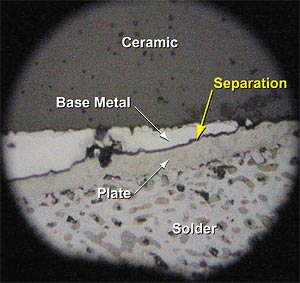2005 Articles
Destructive Testing for Reconstructing Processes
Cross-sections still beat alternate means for accurate problem-solving.
Nondestructive testing methods are obviously the preferable means for detecting potential problems, but sometimes these methods are unable to examine fully issues that are indicative of process weaknesses. A company was concerned that the number of thermal excursions that ceramic 0805 capacitors were experiencing could be causing microcracking. These capacitors were going through a rework operation with no preheat or baking step. Cleaning was performed on the boards with DI water after each SMT pass, wave soldering and rework operation. A soldering iron was applied directly to the rework area around the ceramic capacitors, causing a high degree of thermal stress to the sensitive ceramic material. We examined these capacitor areas using acoustic micro-imaging and cross-sectional analysis to detect stressed areas and cracks in the ceramic.
 |
| Cross-sectional sample (500x magnification) shows a small fissure in solder joint at the base of an 0805 capacitor. |
For our analysis, five samples were remitted to undergo acoustic micro-imaging and cross-sectional analysis. Before shipment, the customer temperature-cycled all the boards to aid in propagation of potential mechanical defects. None of the five samples showed cracks or anomalies in acoustic micro-imaging analysis, but cross-sectional analysis gave a different story. Each of the five cross-sectioned samples showed a degree of stress, causing arching of the component bodies. Two of the five samples also showed small fissure separations at the capacitor base metal to plate interface, caused by thermal stress that the capacitors underwent. These microcracks were undetectable with acoustic micro-imaging analysis because they were on a curved surface. The conditions of these fissures were not bad enough to indicate catastrophic device failures in the field, but did indicate potential field problems and processing weaknesses due to the thermo-mechanical stresses applied to (and still resident in) the components. Cross-sectional analysis also gave a good picture of the intermetallic structures of the five samples, which all showed adequate component body and board attachment. Acoustic micro-imaging and cross-sectional analyses showed solder volumes larger than optimal. Along with the thermo-mechanical stress, the volume of deposited solder and the solder pad size are also contributors to component stress through solder attach.
To prevent fissures and warpage caused by thermal excursions applied to ceramic capacitors, we recommended the company add a baking step and preheating step before using the soldering iron in rework. Ceramic materials are not supposed to undergo temperature applications of more than 70°C per second, and we suggest that they are preheated to 100°C before rework continues. If there are several cleaning steps (as in this company’s operation), it is also important to bake the boards prior to rework so that any fluid is evaporated before the soldering iron is applied. Although we did not know the exact soldering profile used for the company’s rework operation, we can assume due to the sensitivity of ceramic materials that there was too much thermal stress without adequate baking and preheating steps. We also recommended that they review board design layers and architecture, solder attach profiles, solder pad sizes for SMT components, and soldermask thickness for solder deposition volume.
This company was lucky that more severe cracking of the ceramic capacitors had not occurred. Cross-sectional analysis confirmed our theory that too much thermal stress was applied. Acoustic micro-imaging is an excellent tool for detecting severe cracks that require immediate attention, but the small cracks on curved surfaces in this scenario were only detectable through destructive cross-sectional analysis.
Terry Munson is with Foresite Inc. (residues.com); tm_foresite@residues.com.




